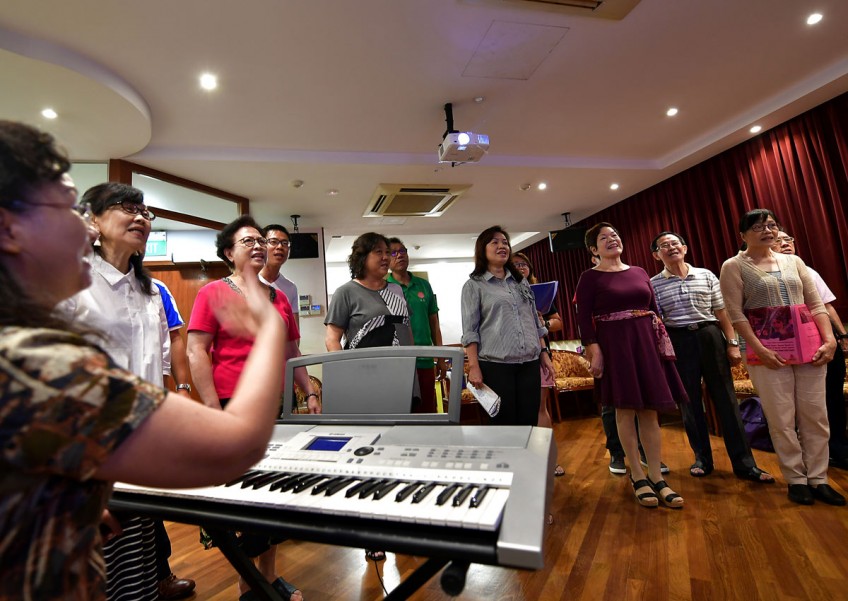Hakkas are in tune with a singing revival

Hakka people used to sing their traditional songs loud and proud at the mouth of the Singapore River in the early 1960s, said freelance voice-over artist Lee Yong Tick.
"Back then, there wasn't much to keep the people entertained at night so some Hakka people would sing," he added.
The 57-year-old was just a child then and did not have the chance to learn or participate. He noted that this practice stopped after people complained the singers were too loud at night.
For decades after that, Mr Lee heard little about Hakka songs or Hakka singing groups - until 2005, when a university senior introduced him to Char Yong (Dabu) Association's Ke Yun Tuan, which translates to Hakka melody group.
It has close to 20 members whose ages range from 30 to 70.
"When I was growing up, people always asked if I knew how to sing Hakka songs but I never picked it up. I decided to join the group to learn how to, since the songs are a big part of our culture," he said.
Through songs, the Chinese dialect is being kept alive here today.
According to the 2010 census, there are more than 230,000 Hakkas here and they form the fourth-largest Chinese dialect group. The largest group is the Hokkiens, followed by Teochews and Cantonese.
The name Hakka literally means "guest people" and was given by other people in the lands where the Hakkas settled.
Despite the name, Hakkas in Singapore can trace their roots to provinces in southern China, where their ancestors lived after migrating from northern provinces like Shanxi.
Char Yong's president Ivan Ho, 65, said scholars believe the Hakkas moved around constantly, with five or six great migrations taking place across a span of 2,000 years.
"Wherever we went, the flatlands and fertile ground were already occupied so we had to reside on hilly terrain or mountainous areas," he added.
This gave rise to traditional Hakka music known as "mountain songs". "We had to sing and shout across the hills - the sharp tone can travel farther to help us communicate with each other," Mr Ho said.
While their ancestors used to sing on mountains and at the mouth of the Singapore River, Hakka groups today sing proudly in concerts and on stages.
At the 10th Hakka Song Festival last year, the representatives of seven local associations performed more than 30 songs.
Two Malaysian Hakka associations were also invited to perform.
Last October, Char Yong's song group also organised its own concert at Hwa Chong Institution's Cultural Centre Theatre.
Around 600 people attended the event which celebrated the group's third anniversary.
Beyond singing, the association also organises Hakka classes for members and their relatives who are interested in picking up the language.
Char Yong has run the class annually for the past two years.
Secretary-general Lam Phin Chong, 66, said enrolment has not been overwhelming but it is encouraging that people in their 20s have signed up.
Lessons are taught by the head of heritage and publication of the association.
"They are keen on picking up simple phrases that they can use in daily life," he added. Students learn words such as "soi mok" (which translates to "fall asleep") and "hong ki" ("awaken").
He said they are difficult words to pick up because they do not sound similar to their Mandarin equivalents ("shui jiao" and "shui xing").
An interesting aspect of the dialect is that the names of some body parts are linked to gender.
For example, tongue is "sep ma" and is "female" while nose is "pi gong" and is "male".
Mr Lam hopes people will be able to pick up the dialect more easily through Hakka songs. The establishment of Hakka TV, a Taiwanese broadcasting station, has heralded more modern compositions.
The station was launched in 2003, two years after the Hakka Affairs Council was set up as Taiwan relaxed its stance on speaking dialects.
The 193-year-old Ying Fo Fui Kun building in Telok Ayer Street, which houses the Hakka clan association, will also reopen as a free public gallery later this year after being shuttered for two years for restoration works.
The gallery is part of the clan association's drive to promote Hakka cultural values, said clan president Lai Ah Keow.
Mrs Joanne Tan, 50, notes that it is difficult to find people who speak Hakka now.
"I'm quite lucky, many of my colleagues are coincidentally Hakka so I get to speak it with them other than with my siblings and cousins," said Mrs Tan, who works at a charity organisation.
Student Rachel Lim, 21, said when she meets other Hakkas, they can bond over other aspects of the culture besides language - such as the nation's founding father Lee Kuan Yew's Hakka heritage and the notion that Hakka women are often strong and hardworking.
She is not fluent in speaking Hakka but can understand it. "I would want to improve it just to communicate with my grandparents better.
"But I predominantly speak English to my parents and friends so Hakka is not a priority or necessity," she said.
She has not taken formal classes but makes use of a different technique. "I imagine my grandma saying what I want to say, and follow after her," she added.
Read also: What various dialect groups bring to the table on Chinese New Year
abigailng@sph.com.sg

This article was first published on Mar 02, 2017.
Get a copy of The Straits Times or go to straitstimes.com for more stories.